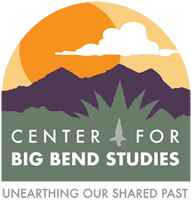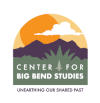The Big Bend Sentinel, November 19, 2009
ALPINE – More than 30 speakers are scheduled to discuss aspects of research during the 16th annual Center for Big Bend Studies conference on Friday and Saturday at Sul Ross State University.
The two-day conference, to be held in the Morgan University Center, focuses on the history, culture, and archaeology of the borderlands region of the United States and Mexico, with an emphasis on the Trans-Pecos and north-central Mexico. The event offers expert presentations on topics ranging from recent Big Bend archaeological investigations to exploration of historical figures from the region.
Sul Ross student Mary Troxclair will speak on “Mayer Halff: Pioneer Jewish Cattleman.” Troxclair is an undergraduate at Sul Ross State University, earning her B.A. degree in History. She attributes the reason she is in Alpine to her own mother who, as a child in the 1940s, was lost with her parents during the summertime in Big Bend and lived to tell the tale.
All of her life, Mary has had a fascination for Israel, which she also credits to her mother. When Mary had the opportunity to accompany her husband, an entomologist, on a month long study leave, she learned of that country’s similarities with her home state of Texas in topography, climate, and water resources. Since then, she has returned for extended stays in Israel, and has studied at the Hebrew University in Jerusalem. After graduation, she plans to become certified to teach English as a foreign language in Israel.
Her presentation covers her research on Mayer Halff, a progressive cattleman and merchant who came to the Big Bend in 1873. Raised in Alsace, France, where his family had been livestock traders for generations, he was no stranger to the business. Water had been plenty, and rail transport was becoming popular in France when Mayer came to Texas at the age of fourteen, where neither was plentiful. He had started out as a peddler in East Texas and eventually, with his brother, became a successful dry goods wholesaler serving El Paso and the Big Bend region. Accepting cattle for payment of goods, he covered hundreds of miles on cattle drives. Halff was the first in Brewster County to transport cattle by rail to and from northern markets. In his lifetime he controlled over a million acres, which he improved by tapping into the scarce commodity of water to make desert land in Texas available for farming as well as ranching today.
Kristen Tyson, a Sul Ross alumna, will give a presentation titled “A Nation at War: The Effect on the World and the Trans-Pecos Region 1910–1945.” Tyson earned her M.A. in History from Sul Ross State University and B.A. in History from Texas A & M University. She resides in Alpine, Texas with her husband, Mark and son, Soren.
Her presentation examines border disputes with Mexico, the World Wars, and the events between these years in the Trans-Pecos, while insight is offered about the residents of the Trans-Pecos region and how they coped with the circumstances during these events. Apart from oral histories, there is a lack of secondary works relating to the effect of the world wars on this region. To bring this period of history to life, she created an exhibit at the Museum of the Big Bend titled, A Nation at War: 1910–1945. The ability to use the museum’s resources, as well as the Archives of the Big Bend, enabled her to produce a well-rounded view of life in the Trans-Pecos and the roles played by Sul Ross State University, Fort D. A. Russell, and the surrounding towns.
The Center is also hosting Dr. John Mason Hart as this year’s banquet speaker. One of the nation’s foremost authorities on Mexican history, Dr. Hart is the John and Rebecca Moores Professor of History and Department Chair at the University of Houston. Hart’s research specialties include the Mexican Revolution, the campesinos, the industrial working class, and the influence of the United States in Mexico. He has authored six books and fifty-five articles, and has won numerous awards for his writing. His most recent work is The Silver of the Sierra Madre.
Dr. Hart will discuss the engagement of the people of the Big Bend-El Paso area with Chihuahua from 1860 to 1920, including miners, railroaders, ranchers and revolutionaries. Among the early visitors, John Robinson of Wells Fargo visited the mines in the Big Bend before heading off to Copper Canyon. Later, the Swift interests bought 1,400,000 acres along the Rio Grande between Presidio and El Paso; and finally, gun runners and revolutionaries became omnipresent before and during the Mexican Revolution (1906–1920).
Many other presenters will be discussing their research on Friday and Saturday, including many Sul Ross faculty and staff. Dr. Judith Parsons, Dr. Paul Wright, Matt Walter, Melissa Crowfoot Keane, Sam Cason, William A. Cloud, Robert Gray, Jamie Hampson, Reeda Peel, John Seebach, and Richard Walter will be sharing their insights.
• • •
Banquet guest speaker Dr. Mason Hart, addressing “Quest for Silver in the Sierra Madre.” Banquet attendance is by reservation.

